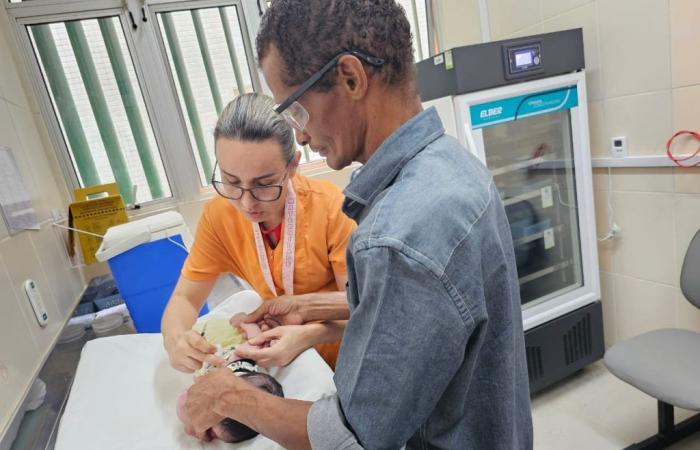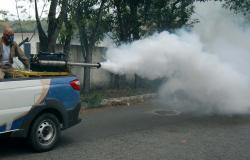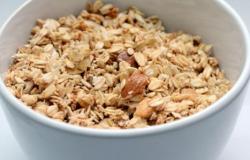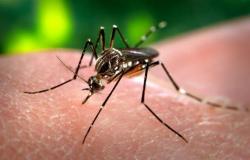The application of the BCG vaccine is recommended by the World Health Organization (WHO) and the Ministry of Health in the first hours of life or in the first 30 days of the newborn’s life. At the Santa Maria Regional Hospital (HRSM), the application is carried out as soon as possible, as soon as the babies arrive at the Maternity Hospital. The only exceptions are those who weigh less than 2 kg and if the mother has received biologicals during pregnancy – in this case, the baby must receive the BCG vaccine when it turns six months old. Routinely, the vaccine is aimed at children aged 0 months to 4 years, 11 months and 29 days.
The BCG vaccine is administered to newborns at the Hospital Regional de Santa Maria, in the first hours of life, to protect against serious cases of tuberculosis | Photo: Jurana Lopes/IgesDF
BCG prevents severe forms of tuberculosis (meningeal and miliary) and is made with bacillus Calmette-Guérin, which is a weakened form of the bacteria that causes the disease. Over the years, BCG has demonstrated significant effectiveness. Studies have shown that neonatal vaccination provides more than 80% protection against severe tuberculosis.
“It is a single-dose vaccine that generally protects for life. Most of the time, it leaves a little mark on the arm. But, if there is no scar, no problem, the person is protected in the same way. There is no recommendation for a booster dose”, explains the nursing technician in the Maternity’s vaccination room, Helenice dos Reis.
It is recommended to be applied to the right arm (deltoid region), intradermally (under the skin), which results in a small elevation with the appearance of an orange peel, which disappears around eight hours after immunization. About three weeks later, the area begins to turn red and possibly form a wound, which may take up to three months to heal.
So that all babies are vaccinated in the first hours of life, Helenice takes a list of all newborns that arrived at the Maternity Hospital and goes from room to room calling parents to take them to the vaccination room, located on the same floor. The professional explains how BCG healing works and performs the application.
Convenience
“It’s a bite that lasts the rest of your life. My daughter will leave the hospital protected and this is extremely important. I really enjoyed being able to vaccinate her here”
Alexandre Ferreira, father of newborn Laura
The Maternity’s vaccination room is open from Monday to Friday. BCG is offered on site, while the hepatitis B vaccine and vitamin K are also administered at the Obstetric Center. “I have been working focused on the application of BCG for a few years now. Generally, there are more babies to vaccinate on Mondays or post-holiday days. I love my job, I really like what I do here”, says Helenice. According to data from the HRSM Epidemiological Surveillance, throughout 2023, 3,073 doses of BCG were administered, while in the first three months of 2024 there were 823 doses.
Post-vaccination care consists of washing normally with soap and water when bathing and drying with a clean towel, without rubbing; keep the child with a sleeved t-shirt to protect the area from dust, insects and so that the child or sibling does not disturb the area and keep the nails cut and do not let it scratch.
Guidty Rodrigues, 30 years old, vaccinated little Harick, just 4 days old, in the vaccination room at the HRSM Maternity Hospital. He is her second son and she remembers that the oldest, 8 years old, had to take BCG at the basic health unit. Therefore, she evaluates how much easier it made.
“I think it’s great to have the vaccine right here in the hospital, without me needing to go to a health center when I’m discharged from the hospital, still without conditions due to the protection. It’s a comfort that he took the BCG and hepatitis B tests here, now only two months old. With my first child, it was much more complicated for me,” he says.
Little Laura, five days old, received the vaccine and had the help of her dad, Alexandre Ferreira, 48 years old, to hold her. “It’s a bite that lasts the rest of your life. My daughter will leave the hospital protected and this is extremely important. I really enjoyed being able to vaccinate her here,” she says.
Protection
Tuberculosis is an infectious respiratory disease caused by a bacteria called Mycobacterium tuberculosis, also known as Koch’s bacillus. According to data from the WHO, in Brazil, there are around 70 thousand new cases of the disease per year and 4.5 thousand deaths. The vaccine is still the only form of protection against serious forms of tuberculosis in children.
Although the disease primarily affects the lungs, it can also affect other organs and/or systems, causing the so-called miliary forms (when a large number of bacteria travel through the bloodstream and spread throughout the body, affecting several organs) and the meningeal form. (when it affects the meninges, which are membranes that surround the brain and spinal cord). The BCG vaccine began to be applied in Brazil in 1977.
*With information from IgesDF
Tags: Babies born Santa Maria Regional Hospital receive BCG vaccine hours life
--





